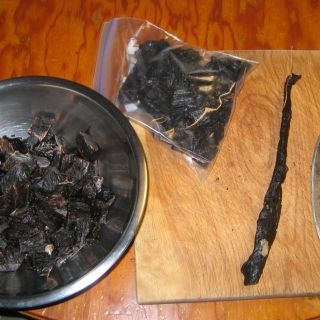
Survival not Sport
On the first fall morning in Alaska, where the leaf tips are a bit frosty and yellow, the ripe blueberries are ready for picking, and your breath hangs in the air, there is a common, unspoken message sent to every Alaskan resident: hunting season is here. For many, this is an exciting time in anticipation of the hunt and an excuse to be outside, but it also means the impending winter is coming, and access to other food options will not be available until the following spring.
Hunting season spans late August through mid-October, with some openings in November through January and March or May, depending on the animal. Some animals that are commonly hunted during the fall season include black and brown bear, moose, caribou, and sheep. In the winter months, seals and whales are often hunted and trappers harvest fox, wolves, and beavers. Some summer openings allow for people to take whales, walrus, or seals as well.
Our members and locals alike rely on these animals for sustenance throughout the year, but especially in winter. The meat from one moose could feed a family of four for a year! In addition to the cost savings of meat from hunted animals, many use the hides for warmth and other body parts for sewing, baskets, hunting implements, and crafts, just as Alaskan and Canadian natives from years ago did.
Hunting is not just a means to an end for subsistence; it is a way of life passed down from generation to generation, especially in more remote areas. Using traditional and modern technology for the hunt, village members raise up their young adults on the importance of a clean hunt, utilizing all parts of the animal they are able to, and providing for their families. The wild, and the chase of hunting, teach many important life lessons including patience, fortitude, gratitude, and technical skill. It also facilitates an excellent opportunity for discipleship as hunters work together and spend time in the quiet of nature together. Removed from distractions, being on the hunt cultivates a natural time for discussion on the bigger elements of life and gives a time for honest conversation and growth and who God is and why He cares for us.
We recently spoke with a woman who had the opportunity to witness a traditional whale harvesting. She was fascinated and humbled by how the whale was brought in to shore, and the whole village partook in systematically processing the whale so each piece was used and each family had a portion. In Alaskan and Canadian native culture, it is especially important to share what is hunted with the widows and elders of the community. Timeless traditions such as this spark greater questions and conversations about how God cares and provides for His people, as well as how His security is greater than any obstacle we may face, be it a harsh climate, difficult circumstances, or otherwise.
It is easy to take for granted the rhythm of the natural world around us, but part of the beauty of living in rural Alaska and Canada is that you can become a part of that rhythm every day. In Genesis, God calls us to be stewards of the land, but He has given us the land for our use and dominion. In the Far North especially, this is a daily calling where His provision and safety are relied on heavily. It takes communities to support one another and be sure everyone has enough—a sacrificial mindset Jesus calls us to when He teaches us to share the bounty He has given. Still, hunting and gathering can be hard and grueling work, so join us in praying for the safety of our community members in the Far North as they enjoy God’s wild splendor and learn of relying on Him more during this hunting season.
“But ask the animals, and they will teach you, or the birds in the sky, and they will tell you; speak to the earth, and it will teach you, or let the fish in the sea inform you. Which of all these does not know that the hand of the Lord has done this? In his hand is the life of every creature and the breath of all mankind.” Job 12:7-10
Additional Posts




